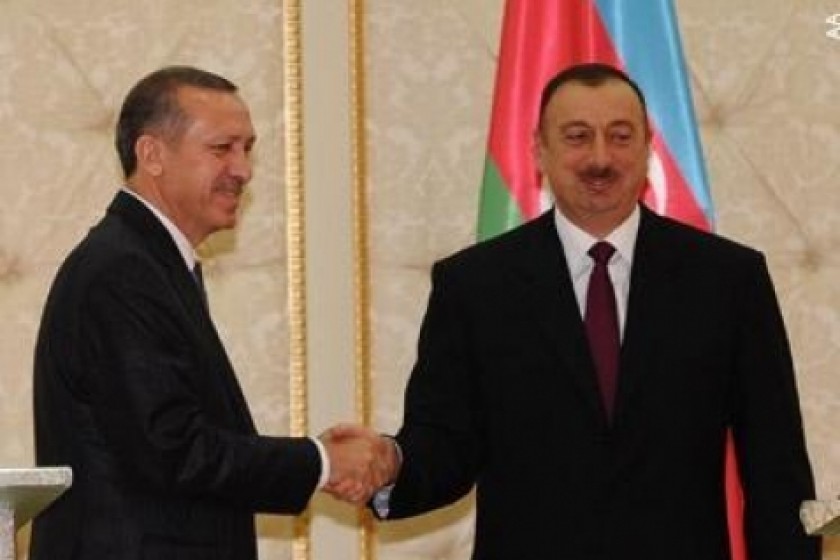
Erdogan Fallout: Turkey Undermines Any Possibility of Stability in the Caucasus
While Turkish Prime Minister Tayyip Recep Erdogan’s visit to Baku eased much of the tension existing in Turkish-Azerbaijani relations, it created a new atmosphere of tension in the normalization process of Armenian-Turkish relations and in the Caucasus region in general. While in Baku, Erdogan made a sensational statement, declaring that the Armenian-Turkish border wouldn’t open as long as the Nagorno-Karabakh conflict wasn’t settled and Armenian forces didn’t withdraw from Azerbaijani “occupied” territories.
If, up until now, the removal of forces from territories surrounding Karabakh and the parallel settlement of the Karabakh conflict, as an official precondition for the normalization of Armenian-Turkish relations, was being bypassed, now, Ankara is raising the issue of the withdrawal of Armenian forces from Karabakh.
This public diplomatic step of Erdogan pleasantly curried favor with the Azerbaijani authorities and society and dispelled all doubts raised by the Azerbaijani side. "There is no reason left to be suspicious. The words of the prime minister constitute the best response for that,” declared Ilham Aliyev.
However, this step by the Ankara government was a severe blow to the Armenian-Turkish reconciliation process. Analysts are already pointing to the fact that with this statement, Ankara has made any continuation of the normalization process between Armenia and Turkey impossible in the near future; essentially returning it to the former status-quo.
This unexpected statement, in reality, can have much greater consequences. Let’s attempt to point them out. By undermining the Armenian-Turkish reconciliation process, Turkey is also condemning its regional policy to failure. Turkey, in fact, is returning to the status-quo that existed in the region prior to last year’s August war.
Turkey is declaring invalid all its achievements after the war that were aimed to strengthen its role in the region. Turkey is destroying its ambitions to become a regional superpower and mediator in regional problems. Moreover, by taking a harder line, Turkey is forfeiting any possibility to play a role in the Karabakh conflict settlement process.
Even though Yerevan officially has stated on numerous occasions that Turkey’s role in the settlement process is unacceptable, nevertheless, by adopting a more moderate position, Turkey might have been able to impact on the process. This has become impossible after declaring its biased position. In addition, by taking this step, Turkey is damaging the Karabakh settlement process and delaying it indefinitely.
Even though the Turkish prime minister claims that the Armenian-Turkish border was closed due to the Karabakh conflict and thus, without a settlement of the latter, the border cannot be opened, it is evident that this “cause and effect” is now in another relationship and that the opening of the border will unavoidably hasten a settlement of the Karabakh conflict. Ankara is creating precedence for Baku to influence its Caucasus policy.
By giving way to Azeri pressures, Turkey is creating the impression that Baku’s policy of extortion is working and that it can be employed to force Ankara’s regional policy to accede to the wishes of Baku.
This again deprives Turkey of being regarded as an independent regional superpower. By taking a harder line, Turkey is willfully restricting its diplomatic maneuvering capability. It isn’t leaving itself any fallback position. Now, any retreat from the statements made it Baku will place Ankara in a much more complicated situation; by making it an untrustworthy partner for both Yerevan and Baku. Incidentally, this step by Erdogan, was not universally accepted in Turkey either.
Even before the prime minister’s statement, Suat Kiniklioglu, a member of the ruling Justice and Development Party and Vice-President of the Turkish Parliament’s Foreign Affairs Committee, stated to Dogan News that while the ruling party had registered advances in its foreign policy, particularly in relations with its neighbors, nevertheless, it had fallen short in terms of Cyprus and Armenia.
He pointed out, “We are not at the point, which we wanted to be, on the issues of Armenia and Cyprus." Former Turkish Foreign Minister İlter Türkmen said that while he was aware that relations with Armenia were linked to a settlement of the Karabakh issue, he couldn’t imagine that this meant a pull-out of forces from Nagorno-Karabakh.
“It seems that in the foreseeable future we will not be able to normalize relations with Armenia and we will lose the momentum that was opened up by the president's visit to Armenia,” he stated.
In the opinion of political affairs analyst Cengiz Çandar, Erdogan pulled Turkey’s Caucasus policy into a swamp with his statement. “Turkey conducted terrible diplomacy and made its Caucasus diplomacy a hostage to Aliyev,” he wrote in the pages of the newspaper Radikal.
The biggest consequence of all this however is that Ankara is nullifying the possibility of stability, peace and cooperation in the region in general. It is showing that all during this time it hasn’t been sincere in its actions and has hoodwinked all those who encouraged and assisted the establishment of Caucasian stability.
And if Ankara is sincere in its intentions this time, then the time has come to accuse it of undermining the possibility of achieving peace and stability in the Caucasus.
 Videos
Videos Photos
Photos




Write a comment